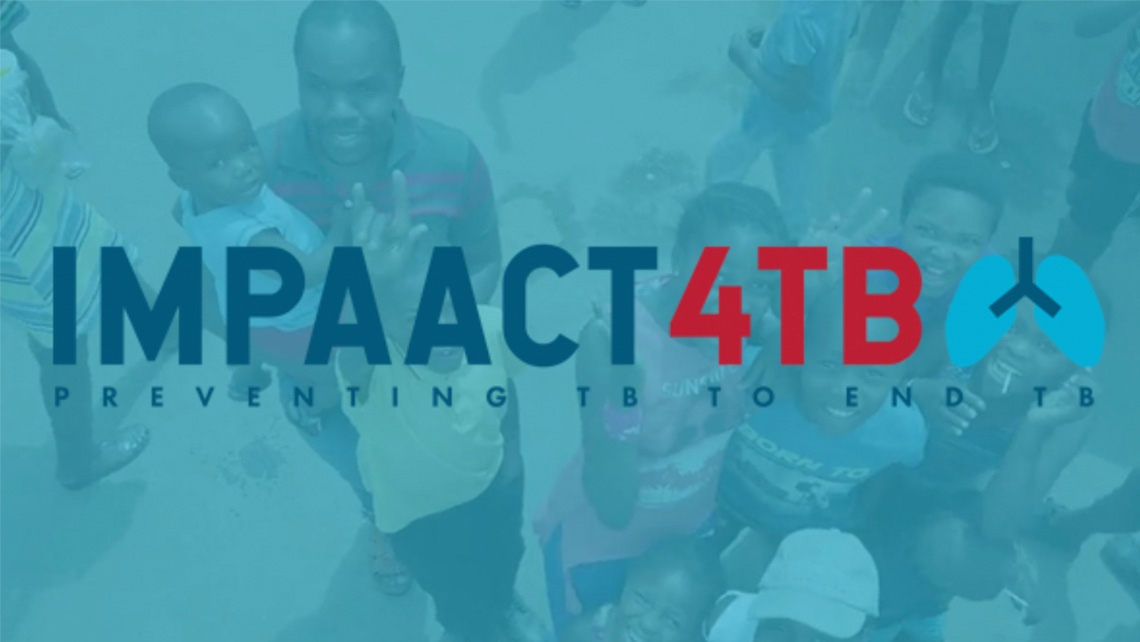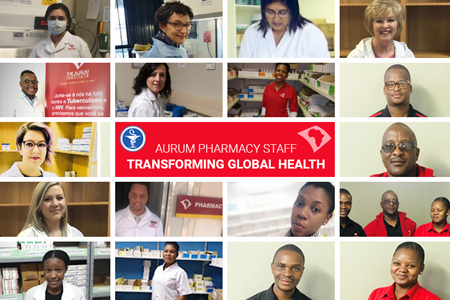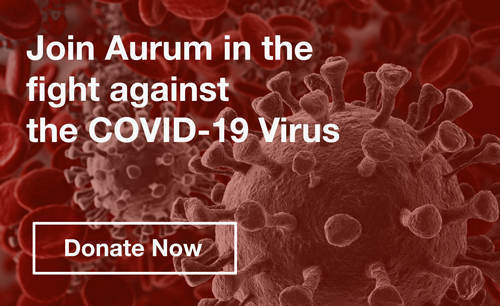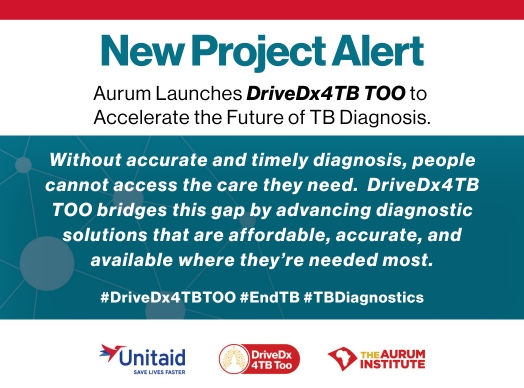Unitaid is investing US$59 million in Aurum's IMPAACT4TB (Increasing Market and Public health outcomes through scaling up Affordable Access models of short Course preventive therapy for TB) project, to prevent people most vulnerable to developing active TB, including people living with HIV and children under age five, from developing active TB disease.
The four-year grant aims to ensure that people with latent tuberculosis infection (LTBI) – who are infected with the TB bacteria, but do not have symptoms and are not contagious – have access to new, shorter, and less toxic, TB treatments. This short-course TB preventive therapy regimen consisting of high-dose isoniazid and rifapentine (RPT) weekly for three months (3HP) is now available, which may address some of the barriers experienced in scaling up Isoniazid Preventive Therapy (IPT). 3HP is associated with less toxicity, better adherence, lower risk of generating resistance, and similar efficacy to IPT.
Goals of the project are to expedite 3HP product launch, under the lowest, sustainable price, to maximize the number of patients treated between 2018-2021. IMPAACT4TB will be generating demand for 3HP by addressing barriers, supporting introduction in key countries and generating evidence to influence policies and uptake globally. A new landscape is being shaped for latent TB with recently released WHO guidelines and expected guidance from PEPFAR, and Global Fund. We will engage the potential 3HP market forecasted demand in project countries, which is estimated to be sufficient to catalyze an increase in supply, demand for and uptake of 3HP in project countries.
THE CONSORTIUM
12 countries covered by the IMPAACT4TB members:
|
AURUM |
South Africa, Mozambique, Ghana |
|
KNCV |
Malawi, Tanzania, Ethiopia, and Indonesia |
|
CHAI |
Cambodia, India, Kenya and Zimbabwe |
|
JHU |
Brazil, India |

IMPLEMENTATION IN THREE PHASES
PRECONDITIONS IN 12 COUNTRIES
The following preconditions will need to be met before the project or certain Phases can begin.
- The WHO guidelines (released March 2018) for the programmatic evaluation of LTBI need to be revised to include 3HP
- RPT can be given safely to PLHIV on DTG, without reaction or dose adjustment
- MOUs with focus countries may need to be revised before implementation of 3HP can start
- Waivers to import RPT into focus countries where they may be required

ADDITIONAL INFORMATION
PHASE 1- Safety and pharmacokinetic (PK) study of 3HP
DTG is likely to replace efavirenz in first line antiretroviral therapy in most low-income countries. A small drug-drug interaction study of DTG and RPT and isoniazid among health volunteers reported hypersensitivity reactions in two of four participants. Due to the safety concern of administering 3HP to PLHIV on a DTG-based regimen, a safety and PK study of 3HP and DTG (an integrase inhibitor likely to be used in first-line HIV treatment) will be conducted in South Africa. ViiV (DTG) and Sanofi (isoniazid and RPT) have agreed to donate their drugs for the study. Country implementation of the project and patients starting 3HP will not commence in PLHIV or child contacts until the results of the PK/Safety study are finalized, expected in Quarter 1 2019.The project will run over four years starting in September 2017 running through July of 2021. Once the results of the PK Safety Study from South Africa interim analysis Phase 1 are known in May of 2018, we will begin country- level start-up activities including 1) identification where recording and reporting and pharmacovigilance tools need to be adapted for 3HP and, 2) reviewing the policy and practice with respect to screening for TB infection prior to starting TB preventive therapy. The 12 countries will start their pilot phase of the phased implementation and India will begin its demonstration project in Year 3-4. The Unitaid-funded procurement of 3HP will start with orders in Q4 of Year 2 and initiation of children and PLHIV on 3HP by Q 1-3 of Year 3. The implementation of 3HP will continue until the end of Year 4. We anticipate that all countries will transition to scaling up 3HP in Year 4 with alternative sources of funding (i.e. MOH Funding, Global Fund and PEPFAR). Dissemination of lessons learnt and research results will be completed by Year 4, but the timeline for demonstration projects and initial scale-up will however vary by country.
Phase 1-2- Establish a price agreement for RPT with the innovator in the short term and with generic supplier(s) in the long term & accelerate development and filing of RPT singles by generic suppliers
The IMPAACT4TB consortium will work on a reduction in the price of RPT with Sanofi. It would involve using a number of levers including, getting countries to include 3HP in their guidelines, anchoring pricing to a large middle income purchaser like South Africa, leveraging Global Fund and PEPFAR funding, and using the Global Drug Facility’s large procurement power across 10 of our countries to achieve lower pricing for RPT. Further price reductions would be expected as the project works to bring on other eligible suppliers by Year 4 onwards. A market intervention to accelerate the entry of cheaper generic-developed formulations is essential to ensure increased competition and affordable RPT in the market in the long term. The current market situation for 3HP is not attractive for generic suppliers to invest on a priority basis. IMPAACT4TB will engage in more formal discussions with suppliers about development opportunities after findings are synthesized and shared with the IMPAACT4TB partners (Q2 2018) under a public, transparent process. Taking into consideration all formulations, a product profile will be released in March 2018. The project has 15 million USD of funding for procurement of 3HP over 4 years to catalyze additional resources to maximize patient courses.Phase 3-Initial scale up of 3HP for PLHIV and child contacts supported
In March of 2018, WHO released its LTBI TB preventive therapy guidelines to include 3HP for low- income countries. IMPAACT4TB members will provide technical assistance to project countries to address barriers to the scale up of 3HP by assisting with: revising TB preventive therapy guidelines to include 3HP, advocating for 3HP, getting RPT onto the essential medicines list, strengthening quantification and forecasting and supply chain management. IMPAACT4TB will invest in activities supporting the detection, assessment, understanding and prevention of adverse effects or any other drug-related problems with 3HP roll out at our sentinel sites. We will develop an implementation manual, job aides and treatment literacy materials for 3HP and contact investigations and train “master trainers” on new guidelines, recording and reporting forms and educational materials. Quality Improvement and monitoring and evaluation (M&E) programmes will be strengthened to improve delivery and monitoring of 3HP for PLHIV and child contacts. IMPAACT4TB members will engage with in-country implementing partners, PEPFAR, Global Fund and other Unitaid-funded projects to support 3HP scale-up and transition. PEPFAR is planning to include a recommendation for TB preventive therapy, including short course preventive therapy, in future country operation plan (COP) guidance. We will assist project countries to develop a long-term procurement plan for 3HP.Evidence generated and disseminated for optimal use of 3HP and scalable models of delivery
India is strategically important to IMPAACT4TB due to the potential high volume market for 3HP, the large public health impact of scaling up 3HP, and the generic manufacturers that could potentially produce RPT. A demonstration project will be undertaken in India to generate evidence to support adoption of 3HP. Part of the transition strategy in our IMPAACT4TB countries is to build evidence by strengthening M&E and evaluating innovative, affordable, delivery models and communicating lessons learnt in scaling up 3HP. This will encourage other donors to fund and non-project countries to adopt and scale-up 3HP.CONSORTIUM MEMBERS
KNCV Tuberculosis Foundation will be the sub-grantee responsible for Malawi, Tanzania, Ethiopia and Indonesia and will implement strategies to enhance adoption, demand and delivery of 3HP, along with generating evidence to support scale-up and policy change.
Clinton Health Access Initiative (CHAI) will lead efforts to bring a generic RPT to market by identifying potential manufacturers, conducting a chemical process analysis of RPT to support API tech transfer and managing the execution of an incentive grant to generic manufacturers of RPT. CHAI will be the sub-grantee responsible for supporting Cambodia, India, Kenya and Zimbabwe.
Johns Hopkins University (JHU) will be the sub-grantee responsible for supporting the scale up of 3HP in Brazil and conducting the demonstration project in the Pune site in India, working through country-based NGO partners. JHU will supervise the safety and PK study, impact and economic modelling, and supervise the implementation research studies at country level.
Treatment Action Group (TAG) will be responsible for developing educational materials for CSOs and conducting market access advocacy work. TAG will support CSOs, selected by a tender mechanism managed by Aurum, to advocate for 3HP starting with our high volume countries followed by the other project countries.
The Global Drug Facility (GDF) is a supportive partner responsible for procurement of 3HP with Unitaid funds. GDF will be responsible for procurement and delivery of Unitaid funded 3HP products to their priority countries using the GDF importation waiver process in all 12 IMPAACT4TB countries.















